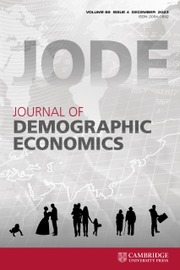Article contents
The role of family networks and social capital on women's fertility intentions in Ouagadougou, Burkina Faso
Published online by Cambridge University Press: 13 October 2021
Abstract
Family solidarities remain strong in African societies. In Ouagadougou, transfers within extended family networks provide an omnipresent means for coping with life's difficulties, and the desired number of children remains relatively high. The role of family networks in maintaining high fertility is rarely studied however for lack of data in conventional demographic surveys. This study uses original retrospective data and logistic regression methods to explore the role of the extended family's social capital in shaping women's desire for children in Ouagadougou. Results show that women belong to three types of family networks: (1) women who belong to large family networks on both her own and her husband's side and who maintain a moderate number of close relations with their own relatives; (2) women who also belong to large family networks on both their and their husband's sides but who maintain a greater number of close relations with their own blood relatives; (3) unmarried women with relatives only on their side and numerous close relations with their family. Support for children's schooling comes more often from women's relatives in networks type 2 and 3, and from husbands' relatives in network type 1. Support for children's schooling increases with the level of economic resources in family networks (proxied by the presence of a public employee), in all network types. Women in type 2 networks (centered on women's relatives) are more likely to want additional children compared to women in type 1 networks (centered on their husband's relatives), after controlling for economic resources in networks. This result suggests that practical support provided by family members could play a role, on top of economic support, in encouraging high fertility in Ouagadougou.
Keywords
- Type
- Research Paper
- Information
- Journal of Demographic Economics , Volume 88 , Special Issue 2: Exchanges in Family and Personal Configurations Beyond the Household , June 2022 , pp. 237 - 255
- Copyright
- Copyright © Université catholique de Louvain 2021
References
- 5
- Cited by


